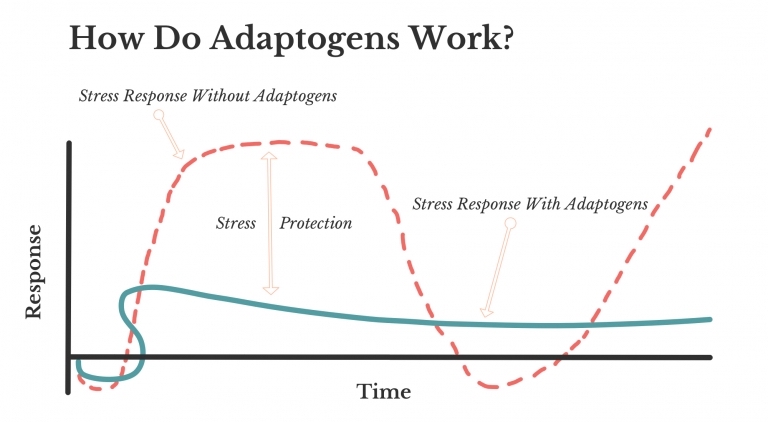
If you’re interested in natural skincare or all-natural remedies to improve well-being, you’ve probably run across the term “adaptogens.” After all, healthier lifestyles incorporating superfoods, plant-based ingredients, and holistic wellness practices are gaining widespread momentum, and adaptogens as of late has been a big part of the trend. Here, we’ve encapsulated the lowdown on adaptogens and why they’re so special.
Adaptogens are herbal compounds that help the body “adapt” to physical, emotional, and environmental stressors. Counteracting the effects of acute and chronic stress, adaptogens act as a physiological resistance mechanism. Found in plant-based herbs and mushrooms, these miracle compounds assist the body to promote optimal, normalized function.
In the early 1900s, Nanai hunters were the first to introduce Russian scientists to berries and seeds that could help night vision. During war times, pilots consumed these “tonics” to increase energy, improve vision, and avoid body fatigue. The results led to what we know about modern-day adaptogens. The term “adaptogen” was introduced into scientific literature by Russian toxicologist Nikolay Lazarev in 1957 to refer to substances that increase the “state of non-specific resistance” in stress.
Although modern doctors and scientists have since popularized the term “adaptogen”, Ancient practices of Traditional Chinese Medicine and Indian Ayurvedic medicine herald the first recorded use of herbal tonics referred to as rejuvenators, qi tonics or rasayana, herbs that are today classified as adaptogens. These tonics were used to normalize the body from ailments ranging from sexual weakness to thirst, shortness of breath to body fatigue, exhaustion to diabetes, and stress management to overall vitality.
Adaptogens interact with four primary systems within the body:
1) Hypothalamic-Pituitary-Adrenal (HPA) Axis or Endocrine system
2) Central nervous system
3) Immune system
4) Sympatho-adrenal system (fight or flight)
On a day-to-day functional level, our system is constantly “resisting” stressors: working out, deadline pressure, running late to an appointment. During these uncomfortable moments, our body releases hormones, such as adrenaline, to resist these stressors and produce a feeling of confidence, strength, or prolonged energy. Adaptogens fuel this natural reaction, giving you natural resistance and extended results.
Research conducted by Dr. Alexander Panossian, Research Projects Director at the Swedish Herbal Institute, indicates that adaptogens work on a cellular level, influencing the body’s cortisol release. His studies highlight the effects of adaptogens on the body’s ability to respond to stress, to produce energy and stamina, and to reduce fatigue.

Three general characteristics were defined in 1969 by pharmacologists Brekham and Dardymov of what constituted a true adaptogen:
The original list of adaptogenic herbs included Panax Ginseng, American Ginseng, Ashwagandha, Siberian Ginseng (or Eleuthero), Schisandra, Rhodiola, Shilajit, Rhaponticum (or Maral Root) and Cordyceps. As research evolves, however, the definition and list of true adaptogens continues to evolve. For example, many researchers would today classify botanicals like Sacha Inchi, Turmeric, Reishi, Licorice Root, Holy Basil, Amla, Bacopa, Goji Berry, Jiaogulan, Gotu Kola, Aloe Vera, Maca, and Shatavari as adaptogens.
In full transparency, the Humanist Beauty Herban Wisdom™ Facial Oil is made with natural extracts that more progressive investigators would classify as adaptogenic such as Licorice Root and Sacha Inchi. You can find the whole list of ingredients used here.
Adaptogens and adaptogenic agents are not without controversy, with some citing poor clinical testing methodology and a lack of solid proof of efficacy. Others point to the thousands of years of use in TCM and Ayurveda as substantiation enough. Due to their proven activity on rebalancing cortisol-related responses, it stands to reason that topical application of adaptogenic substances on inflammatory skin conditions such as psoriasis, eczema, acne or edema or erythema could be beneficial to calming and soothing the skin. Though most adaptogens are perfectly safe when used in skin care, it is important to read the product labels, and if there are concerns, consult with a skin specialist, if possible, before use.

Disclaimer: Statements on this website have not been evaluated by the FDA. These products are not intended to diagnose, mitigate, treat, cure, or prevent any disease, nor are the products intended to affect the structure or any function of the body of man/woman or other animals. CANNABIDIOL USE WHILE PREGNANT OR BREASTFEEDING MAY BE HARMFUL. KEEP OUT OF REACH OF CHILDREN. Humanist Beauty Herban Wisdom products include hemp extract that contain less than 0.3% THC. Products containing CBD or THC are not to be used by or sold to persons under the age of 21.
We don’t retouch the skin of the model humans shown on this website. Keepin’ it real.